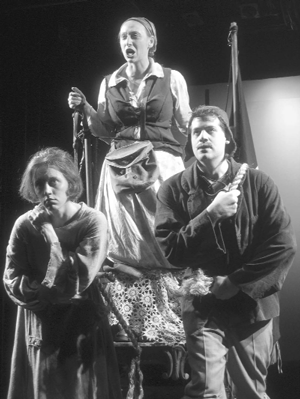Caribbean conceit, moral plodding, and perversion, porn, and thuggery
Anthropomorphism in entertainment is best left to the experts, and however much one loathes singing and dancing lions, warthogs, or rodents who can whip up a ball gown in the course of one high-pitched song, no one does the critter thing like Disney. And, after seeing “Miracle Brothers” at the Vineyard, once again it’s clear no one else should even try.
The show, with book, music, and lyrics by Kristen Childs, is a simplistic story about magical dolphins that can take on the shapes of other life forms to play “games.” In the game foisted upon the poor audience for this show, the dolphins become human in the 18th century and act out a play about slavery and racism with the realization two-and-a-half long hours later that under it all, we really are all brothers. If she weren’t already dead, Bambi’s mother would die of embarrassment.
The Caribbean conceit is not without potential. The bouncy music and obvious rhymes are innocent, even if the innocence quickly cloys. The plot is a shambles with pirates, lost loves found, and a narrative so out of control that the second act seems like a different show altogether—a kind of Gilbert and Sullivan go tropical—from the first.
Tina Landau’s direction fails to give form or sense to the incoherent narrative and what’s on stage is calypso chaos at an incessant clip, replete with incongruous shifts in plot, energy, and focus. At one point we’re following the tale of Fernando and Green Eyes, the miracle brothers who are master and slave. Then we’re off with the pirates, following the lost love of Fernando’s mother.
Fortunately, the company is terrific. Tyler Maynard as Fernando brings his wonderful voice and boyish presence to a role that is remarkable for its lack of depth. Similarly, Clifton Oliver as Green Eyes has a wonderful voice and is always interesting to watch, even if what he’s being forced to do is undeveloped.
Lorinda Lisitza, in the title role of “Mother Courage,” seen in the center with Sara Jeanne Asselin and Seth Duerr, delivers a one-note performance, in which despite moments of fire, most opportunities are missed.
The rest of the superlative company, including delightful performers Jay Goede, Cheryl Freeman, Kerry Butler, and Nicole Leach, work hard to enliven the material that is never equal to their talent. Even the rich, green set and wonderful graphics from G.W. Mercier are superior to the material, which at best is immature and facile, and at worst just dull.
Mother Courage is a desperate woman—a conniving, plotting, and amoral mother who wants her children to succeed in the war-torn world of the 17th century. As a metaphor, Brecht’s character defines the corruption of the spirit to which one descends when survival is the motivation. Brecht’s play shows how morals, social structures, commerce, religion, and even love are luxuries of the affluent. It is a timely message as we watch the frat boy posturing and rampant cronyism of the Bush administration smashing headlong into others’ need for survival. Survival will always trump intellectual constructs; it’s how we are reminded that, at the end of the day, we’re merely mammals.
Unfortunately, the heavy and self-indulgently artistic production of “Mother Courage” now at the Cocteau Repertory misses the point. Where it should be visceral, it’s plodding. Where we should be horrified at the degradation of the characters and the ruin wrought by war, we are nonplussed. There are songs in the show, but the lyric that would most define this lackluster mounting is, “Pick yourself up, dust yourself off, start all over again.”
Though the Cocteau deserves credit for trying to confine Brecht’s sprawling epic to their diminutive stage, the intimacy is not used to bring the horrors home. Instead, it feels remote. One problem is the miscasting of Lorinda Lisitza in the title role. In isolated moments, Lisitza shows the fire and range that she has. Those moments are stunning, but she has not been directed and starts the play at the same intensity she ends it. For all her potential, Lisitza delivers a one-note performance. By not fully engaging with the text, director David Fuller turns this mother who sacrifices everything to win seem like Madame Rose for the clinically depressed.
“The Banger’s Flopera” by the Inverse Theater, a retelling of “The Threepenny Opera” that has just closed, was an exciting, energizing piece of work that reaffirms my faith in the passion and thoughtfulness of some theater artists. The daring show succeeded on so many levels, not the least of which was as commentary of the dissolution of a culture.
It’s easy to forget how the original source material for this production, “The Beggar’s Opera” by John Gay, was radical in the early 18th century, and seen by the masses only because the nobility allowed it. Over time and in the face of vastly changed mores, the play’s risks have come to seem trivial and it has become “art that’s good for you,” severely hampering its ability to challenge, move, and eventually provoke an audience.
In its retelling, Inverse returned the story to the challenging high stakes game it was originally, positing pervasive perversion, porn, and thuggery as the inherently logical result of systemic moral corruption. The conceit is brilliant and an absolutely appropriate challenge directed at much of what passes for art in the mainstream, commercial theater.
There wasn’t a detail missed in Kirk Wood Bromely’s book and lyrics, which are extraordinary. The company was consistently brilliant with performances notable for their honesty, risk-taking, and visceral humanity.
gaycitynews.com




































